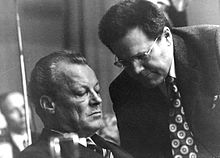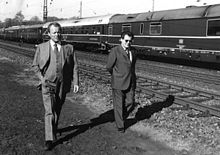Günter Guillaume

Günter Karl Heinz Guillaume (born February 1, 1927 in Berlin ; † April 10, 1995 in Eggersdorf as Günter Bröhl ) was an officer on special operations (OibE) of the Ministry for State Security (MfS) of the German Democratic Republic (GDR) and as an agent in Federal Chancellery namesake of the Guillaume affair . His exposure was one of the largest espionage cases in the history of the Federal Republic and one of the reasons for the resignation of Federal Chancellor Willy Brandt , whose personal advisor he was from 1972 to 1974.
Life
childhood
Günter Guillaume was born in 1927 as the son of a musician in Berlin and attended elementary school from 1933, which he left after the 8th grade. He began an apprenticeship at the Atlantic publishing and print service GmbH in Berlin, before he first three months when in autumn 1944 Reichsarbeitsdienst was 1944/1945 he was in World War II anti-aircraft auxiliaries . The Berliner Zeitung reported in July 2007, citing the historian Götz Aly , that Guillaume, as a Hitler Youth, had also become a member of the NSDAP in 1944 . This happened on April 20, 1944. At the end of the war he was taken prisoner by the British, but fled from it and worked for a farmer in Schleswig-Holstein. When he returned to Berlin in 1945, he worked there in 1946 and 1947, initially as a photographer for an advertising service, and later as a photo reporter in Kleinmachnow .
Recruitment by the MfS and relocation to the Federal Republic
In 1950 Guillaume became editor of the Volk und Wissen publishing house in East Berlin . In 1952 he joined the SED . According to the databases of the HVA , he was registered as an unofficial employee (IM) in September 1954 under the code name "Hansen" . His wife Christel Boom , with whom he had been married since May 12, 1951, was recorded in October 1958 under the code name "Heinze". Their son Pierre Boom emerged from the marriage. The Ministry of State Security initially subjected Guillaume to several months of intelligence training. His mother-in-law, a Dutch woman, registered her place of residence in Frankfurt am Main , so that the couple were able to “flee” to the West in 1956 without undergoing the secret service interviews in the emergency reception center. The MfS also gave them “start-up aid” of 10,000 DM. In Frankfurt, Guillaume ran the Boom am Dom , a coffee and tobacco shop.
Joins the SPD and spies in the Federal Chancellery
In 1957 he joined the SPD . Christel Guillaume became secretary in the party office of the SPD Hesse- South. Günter Guillaume had been a full-time party official for the SPD since 1964, initially as managing director of the SPD sub-district in Frankfurt am Main and, from 1968, of the SPD parliamentary group in the city council. In the same year he was also elected to the city council. In 1969 Guillaume led the election campaign of the Federal Minister of Transport Georg Leber in his constituency in Frankfurt and demonstrated his organizational talent, which earned the minister a very high number of first votes.
After the election, Leber placed Guillaume as a consultant in the economic, financial and social policy department of the Federal Chancellery , where he earned the trust of his superiors. In 1972 he was promoted to personal advisor to Federal Chancellor Willy Brandt due to his great work and organizational talent . Here he got access to secret files and the discussion rounds in the inner circle around the Federal Chancellor . In addition, Guillaume had insight into Brandt's privacy.
The Guillaume couple are arrested and sentenced
Although the German security services had had evidence of the Guillaume's activity as an agent since mid-1973, almost a year passed before they were arrested. The starting point was that the MfS sent its agents in the West encrypted birthday telegrams in the 1950s. The combination of the dates of birth did not succeed in corroborating the suspicion against Guillaume for years, although the judicial evidential value was negligible. On April 24, 1974, Guillaume was arrested in Bonn on suspicion of espionage. When he was arrested, Guillaume said: “I am an officer in the National People's Army of the GDR and an employee of the Ministry for State Security. I ask you to respect my officer's honor ”. This sentence was an essential aspect that could be used in court and spoke against him, since the evidence was relatively thin until his confession. The exposure marked the beginning of the Guillaume affair named after him . It triggered a serious domestic political crisis in the Federal Republic of Germany, which culminated in Willy Brandt's resignation as Chancellor on May 7, 1974 . On June 6, 1974, at the request of the opposition, the Bundestag decided to set up a parliamentary committee of inquiry to investigate the affair, which revealed serious oversight deficiencies by the security authorities.
On December 15, 1975, Günter Guillaume was sentenced by the 4th Criminal Senate of the Düsseldorf Higher Regional Court to thirteen years imprisonment and five years of loss of office and the loss of the right to vote, among other things for treason , and his wife to eight years imprisonment. Günter Guillaume served part of the sentence in the Rheinbach correctional facility .
His agent activity was less important than previously thought. According to the HVA databases , only 24 reports and documents were received under the code name “Hansen” between July 1969 and April 1974, i.e. 5 reports per year. Half of the information registered related to internal matters within the SPD. Almost a quarter were devoted to union issues. Only a good quarter dealt with the politics of the Brandt government. The low value of the "Hansen" source is also reflected in the fact that the HVA rated fourteen of the nineteen items it received with a "3" ("average value"). Only five received the grade “2” (“valuable”) and none received the grade “1” (“very valuable”).
Early release and honors in the GDR
In 1981, the Guillaume couple returned to the GDR as part of an exchange of agents , where they were officially celebrated as " spies of peace ". Both spouses received the Karl Marx Order ; Günter Guillaume was promoted to colonel in the MfS, his wife Christel to lieutenant colonel in the MfS. From then on, Günter Guillaume appeared as a “star guest” at MfS agent training courses. On 28 January 1985, gave College of the Ministry of State Security in Potsdam Guillaume in "recognition of his outstanding service to the safeguarding of peace and the strengthening of the GDR" the title of " Doctor of Laws ( honoris causa )."
Divorce, second marriage and death
Due to an affair that Günter Guillaume had started on the day of his return to the GDR with the nurse Elke Bröhl, who also worked for the MfS, Christel Guillaume divorced her husband on December 16, 1981. In 1986 Günter Guillaume married Bröhl, 17 years his junior, whose family name he adopted (cf. Hermann Schreiber , Chancellor Fall ). In 1988 he published his memoir The Statement . Günter Bröhl died on April 10, 1995 of metastatic kidney cancer in Petershagen / Eggersdorf , near Berlin . He is buried in the Parkfriedhof Marzahn in Berlin.
Further life of Guillaume's son and first wife
The Guillaume's son, Pierre Boom (* 1957), went to the GDR after his parents were arrested in 1975, where he trained as a photojournalist. In 1988 he applied for an exit visa and moved with his family to Germany that same year. Because the MfS did not want to allow his departure under the name Guillaume, he took his mother's maiden name, which she had acquired through adoption by a Dutchman, and called himself Pierre Boom from then on. In 2004 he published his memoirs under the title The Stranger Father .
Günter Guillaume's first wife died as Christel Boom on March 20, 2004 of a heart condition.
Fonts
- The statement. Recorded by Günter Karau. Military Publishing House of the GDR, Berlin 1988, ISBN 3-327-00670-9 (West German edition: The statement. How it really was. Universitas, Munich 1990, ISBN 3-8004-1229-2 .)
- Klaus Eichner , Gotthold Schramm (ed.): Scouts in the west. Top sources of the GDR Enlightenment remember. Edition Ost , Berlin 2003, ISBN 3-360-01049-3 . (With an article by Günter Guillaume.)
literature
- Hermann Schreiber : Fall of the Chancellor. Why Willy Brandt resigned. Econ, Munich 2003, ISBN 3-430-18054-6 .
- Pierre Boom , Gerhard Haase-Hindenberg: The strange father. The son of Chancellor's spy Guillaume remembers. Aufbau-Taschenbuch-Verlag, Berlin 2005, ISBN 3-7466-2146-1 .
- Eckard Michels : Guillaume, the Spy: A German-German Career. Ch. Links Verlag, Berlin 2013, ISBN 978-3-86153-708-3 .
- Jens Gieseke, Helmut Müller-Enbergs : Guillaume, Günter . In: Who was who in the GDR? 5th edition. Volume 1. Ch. Links, Berlin 2010, ISBN 978-3-86153-561-4 .
- Klaus Seemann: The Günter Guillaume espionage case in the Federal Chancellery. In: Klaus Seemann: Disenchanted Federal Chancellery - Memories of a Chairman of the Staff Council. vpa Verlag political archive, Landshut 1975, ISBN 3-921240-53-0 . there: second part, pp. 83–161.
- Stephan Konopatzky: The possibilities and limits of using SIRA databases using the example of the Stiller and Guillaume cases. In: Horch and Guck , 39/2002, pp. 46–55.
Movie
- Doris Metz: shadow fathers . Matthias Brandt and Pierre Boom describe the memories of their fathers in an uncommented documentary.
- In the shadow of power . With Matthias Brandt as Günter Guillaume.
Web links
- Literature by and about Günter Guillaume in the catalog of the German National Library
- Article by Guillaume's son in Cicero
- Hendrik van Bergh / WDR 1978, ARD AUDIOTHEK: Secret agents in the Cold War - Günter Guillaume - Anatomy of a spy
- Gerhard Haase-Hindenberg ran stupid - How the Stasi found out about the arrest of their top agent. In: Die Welt from April 23, 2004
- BStU , topic: The Guillaume Affair
- WDR 5.de: Secret Agents in the Cold War - Günter Guillaume - Anatomie eines Spions Dok5 summer series: Spione from July 26, 2020, feature, accessed in the media library on July 25, 2020
Individual evidence
- ↑ Nina Grunenberg, The hook on which a chancellor hung himself . In: Die Zeit , June 27, 1975.
- ^ Helmut Müller-Enbergs: Unofficial employees of the Ministry for State Security . Christoph Links Verlag, Berlin 1998, ISBN 3-86153-145-3 ( online ).
- ↑ a b c d e Note in: WDR 5.de: Secret agents in the Cold War - Günter Guillaume - Anatomy of a spy. Dok5 Summer Series: Spies from July 26, 2020 (web links)
- ↑ a b End of a chancellorship. April 23, 2019, accessed May 12, 2019 .
- ↑ The Guillaume case . In: Der Spiegel . No. 41 , 1974 ( online ).
- ↑ Message: Authority refuses to provide Stasi researchers with legal assistance in the trial against two alleged ex-GDR spies. In: Focus , 43/2012. Literally: A high-ranking state security official told FOCUS: "Compared to this couple, Chancellor's spy Guillaume was a weak man."
- ^ Karl Wilhelm Fricke : Historical revisionism from an MfS perspective ( Memento from June 27, 2013 in the Internet Archive ) (PDF; 132 kB)
| personal data | |
|---|---|
| SURNAME | Guillaume, Günter |
| ALTERNATIVE NAMES | Bröhl, Günter (name since 1986) |
| BRIEF DESCRIPTION | German GDR spy in the Federal Chancellery (1970–1974) |
| DATE OF BIRTH | February 1, 1927 |
| PLACE OF BIRTH | Berlin |
| DATE OF DEATH | April 10, 1995 |
| Place of death | Eggersdorf |
